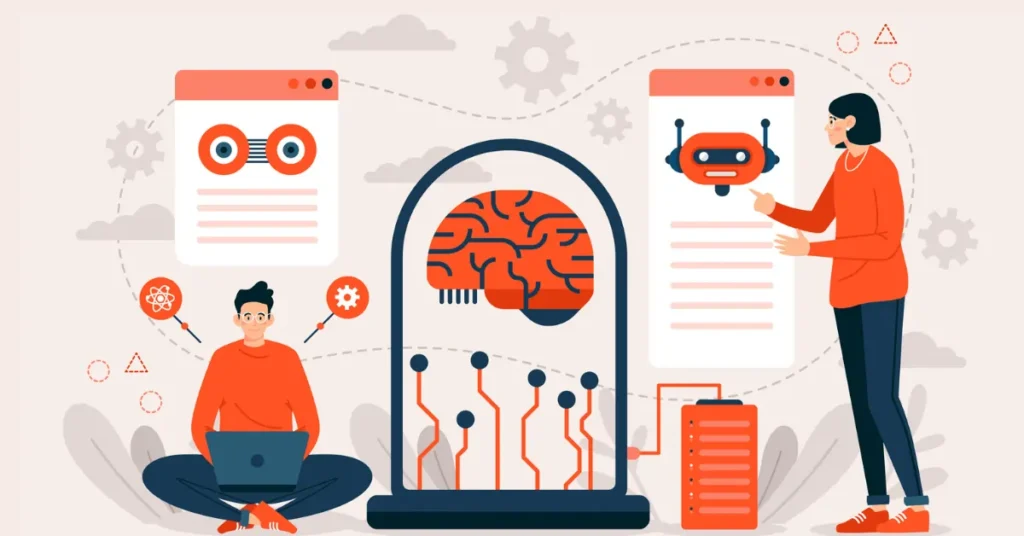Artificial Intelligence has transcended the boundaries of science fiction. It’s a transformative force that’s shaping our world in profound ways. By understanding AI, we’ll explore the fascinating world and AI uses, the precautions to take, and its impact on SEO
Understanding AI

What is Artificial Intelligence?
Essentially, Artificial Intelligence involves creating computer systems with the ability to execute tasks that traditionally demand human intelligence. These tasks encompass problem-solving, speech recognition, decision-making, language translation, and visual perception. AI systems use algorithms, large datasets, and iterative learning to mimic human cognitive functions.
Types of AI
AI can be categorized into two main types:
Narrow AI (or Weak AI): This type of AI is designed to perform a specific task or a set of closely related tasks. Instances encompass virtual personal assistants, software for recognizing images, and algorithms providing recommendations on streaming platforms.
General AI (or Strong AI): General AI refers to a system with human-like intelligence that can understand, learn, and apply knowledge across a wide range of tasks. This type of AI, while progressing, is still predominantly theoretical and hasn’t been fully actualized.
AI Uses
AI in Everyday Life
AI’s presence in our daily lives is pervasive. Consider the following scenarios: Virtual Personal Assistants: Siri, Alexa, and Google Assistant are virtual personal assistants that use AI to respond to voice commands, set reminders, answer questions, and even control smart home devices.
E-commerce Recommendations: When you shop online, AI algorithms analyze your browsing and purchase history to suggest products tailored to your preferences.
Social Media Content: Social media platforms utilize AI to tailor your news feed, presenting posts, ads, and content that resonate with your interests.
Healthcare Diagnostics: AI-driven diagnostic tools scrutinize medical data, facilitating disease detection and treatment planning. Autonomous Vehicles: Self-driving cars depend on AI for instantaneous decision-making, navigation, and obstacle evasion
AI in Business
Beyond everyday life, businesses are harnessing AI for diverse objectives:
Customer Support Chatbots: AI-driven chatbots provide instant responses to customer inquiries and streamline customer service operations.
Data Analysis: AI algorithms scrutinize extensive datasets to extract insights, guide decision-making, and forecast market trends.
Predictive Maintenance: In sectors such as manufacturing, AI anticipates equipment failures and organizes maintenance, minimizing downtime and expenses. Natural Language Processing (NLP): NLP algorithms enable sentiment analysis, language translation, and content generation, enhancing marketing and communication efforts.
AI Precautions
Despite the myriad advantages of AI, it poses challenges and raises ethical concerns:
Data Privacy
AI relies heavily on data, and concerns about data privacy are paramount. It’s essential to handle user data responsibly, adhere to data protection regulations, and ensure transparency about data collection and usage.
Algorithm Bias
AI algorithms may adopt biases from their training data, risking unfair outcomes. Diligent curation and oversight of training data are essential to minimize bias and discrimination.
Job Displacement
As AI takes over specific tasks, there are apprehensions regarding the potential displacement of jobs.
Security Vulnerabilities
AI systems can be vulnerable to hacking and manipulation. Robust security measures are imperative to protect AI-driven applications and networks.
Ethical Considerations
AI raises ethical dilemmas, especially in areas like autonomous weapons and deep fakes. Ethical frameworks and regulations must evolve to address these challenges.
AI Impact on SEO
Understanding AI’s Role in SEO
AI is revolutionizing the field of SEO in several ways:
Content Generation:
AI-driven tools can generate high-quality content, helping websites keep their content fresh and engaging.
Keyword Research:
AI tools can analyze vast amounts of data to identify relevant keywords and search trends, enhancing SEO strategies.
Voice Search Optimization:
With the rise of voice assistants, AI helps websites optimize for voice search queries, which often differ from text-based searches.
User Experience:
AI has the capacity to enhance user experience through content personalization, recommending related articles, and refining website navigation, thereby contributing positively to SEO rankings.
Search Engine Algorithms:
Search engines like Google use AI algorithms to deliver more accurate and relevant search results to users.
AI and SEO Challenges
While AI presents opportunities, it also presents challenges for SEO professionals:
Algorithm Changes:
Search engine algorithms that use AI are constantly evolving, making it essential for SEO experts to adapt quickly.
Content Originality:
AI-generated content must adhere to standards of originality and substance to evade penalties imposed by search engines
User Intent:
Understanding and optimizing for user intent in AI-driven search results is crucial to maintaining visibility.
Conclusion
Artificial Intelligence is reshaping our world, from how we interact with technology to how businesses operate and even how we approach SEO. Understanding AI, its uses, taking precautions, and adapting to its influence on SEO is crucial in navigating this ever
Images designed by @freepik

